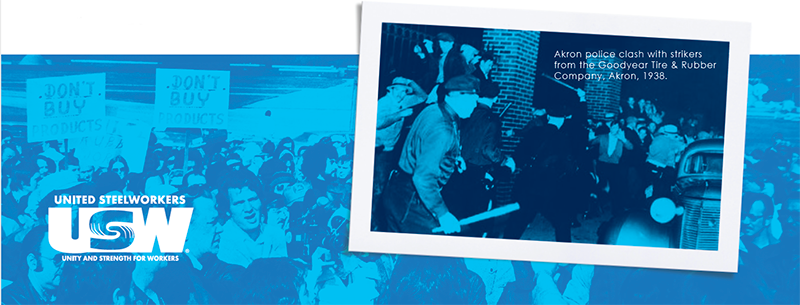
Click here to download this information as a PDF you can share with members of your local.
Stronger Together
We are stronger when we join together to negotiate a fair contract. We increase our power even more when we work together across multiple locations. Negotiations are never easy, but together, we can reach an agreement that provides good wages and strong benefits.
No Struggle, No Progress
Management is not going to give us anything. It never has and it never will. Instead, our progress comes through sacrifice and struggle.
Our union has a long history of successfully fighting for fair treatment. Many workers organized in the 1930s to make a better life for themselves and their families, and rubber workers led the way. When workers organized the first successful sit-down strike at Goodyear in Akron, Ohio, in 1936, the company attempted to violently disperse the sit-down strikers, enlisting local police to attack picket lines. But Rubber Workers remained strong, paving the way for a brighter future for all working people.
However, our struggle continues. Corporate CEOs rake in millions while seeking to diminish our benefits and minimize our wage gains. We must again use our bargaining power to win the good paying jobs, affordable health care and dignified retirement we’ve earned for ourselves and for future generations.
History & Achievements
1935: United Rubber Workers established to fight back against dangerous working conditions, low wages and a lack of benefits.
1936: Workers at Goodyear in Akron, Ohio, initiate a sit-down strike in response to company moves to lower wages, increase working hours and lay-off people arbitrarily. Management attempts to use police to assault strikers in an unsuccessful effort to bust the union. Rubber Workers roll back the increased hours and secure seniority rights in the event of layoffs.
1937: Following an eight-week strike, Firestone signs the first union contract for a major tire company.

1940: Union wins vacation days for the first time in the face of strong opposition from tire companies.
1941: Union achieves a significant wage increase as Goodyear becomes the last of the major tire companies to sign a union contract.
1946: Workers establish double time for Sunday and holiday work.
1953: Workers begin receiving medical benefits, including surgical and hospital care.
1956: Union obtains Supplemental Unemployment Benefit (SUB) to provide economic support for members who are laid off.
1959: Contracts improve pension plan and retirement benefits.
1960s: Workers receive steady gains in wages and pensions along with increased vacation time and holidays.
1976: Historic settlement with the Big 4 tire companies provides major wage boost and cost of living adjustment (COLA) to keep pace with rising prices tracked by the Consumer Price Index.
1987: Union health and safety work expands as OSHA establishes a benzene standard. Union launches campaigns to challenge plant closings and outsourcing of jobs and steps up organizing campaigns at non-union plants.
1994: Strike at Bridgestone Firestone challenges company efforts to gut the union contract.
1995: United Rubber Workers merge with the United Steelworkers (USW). The USW expands a global campaign against Bridgestone Firestone, including extensive protests such as the Black Flag campaign at racing events and work stoppages by global allies from Brazil to South Africa.
1996: Strike settled at Bridgestone Firestone with wage hikes, restoration of paid holidays and three more plants (Bloomington, LaVergne, and Warren County) are brought into line with the master.
2005: After an extended contract campaign, the union successfully pushes back corporate demands for deep concessions. Workers make gains in wages, COLA and pension increases and in securing job protections.
2006: Goodyear locals strike for twelve weeks. Settlement includes creation of a fund for retiree medical benefits, $550 million invested in USW-represented plants and application of COLA to hourly pay rates.
2014 - present: USW initiates a series of trade enforcement cases to level the playing field on tire manufacturing. The union successfully challenges dumping and illegal subsidies on vehicle, light truck and off-the-road tires flooding the U.S. from other counties.
